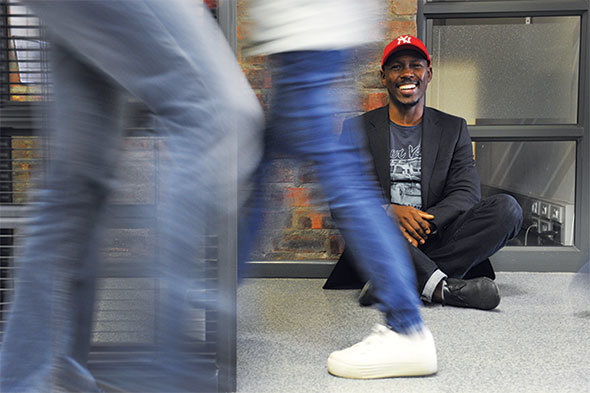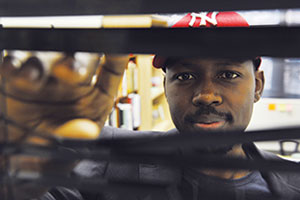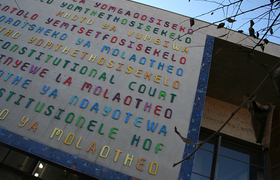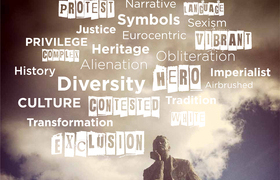What does it mean to be human?
27 July 2015
What does it mean to be human? The question can be raised at the metaphysical or spiritual level; and doing so, Dr Buhle Zuma believes, would be an insightful corrective to our often overly materialist and evolutionary biology conceptions of the human figure. Alternatively, the question can be raised within the space-time envelope of history and lived human experience. In this article, he explores the latter path.
The dawn of western modernity (some scholars argue) begins with the year 1492, when Christopher Columbus voyaged to what he believed was India. The encounter between Columbus and the native Carib and Arawak 'Indians' of America soon led to a debate in Europe about whether the Indians were human or not.
In this debate, the Indians were caught in a double-bind. If they were considered to be human – even if of a lower order than the Europeans – then they needed to be converted to Christianity, with its accompanying civilising processes. If, on the other hand, they were deemed not to be humans, then they could be enslaved and exploited, and all their forms of life would be deemed disposable.
Another moment (and not the only other one) in which the question of the human emerges is the trans-Atlantic slave trade between the 16th and 19th century. Here, the Africans who experienced the brutality of the trade of human beings within the global capitalist labour market raised two intimately related questions: What does it mean to be human? And what is freedom?
It is these two questions, it seems to me, that confront us in various iterations in this postapartheid moment or condition.
The reiteration of these questions includes continually increasing inequality that is still racially marked; the no-less-increasing community protests for basic needs such as sanitation and housing; the spatial and structurally unchanged architecture of apartheid; state violence against miners in Marikana; the epidemic state of everyday forms of violence in the lives of poor black people in the townships; the recent student activism at UCT under the banner of the Rhodes Must Fall movement; the 2008 and 2015 killings of other African peoples in South Africa; and so forth.
Among other things, what these events point to is the unfinished business of freedom that was 'promised' during the legal and political collapse of apartheid. The mistake we made was to take the democratic changes that swept across South Africa as the dawn of freedom. 1994 represented a critical moment of political emancipation, which is the first step towards rearranging colonial/apartheid inhumanity articulated in unethical social relations and institutions of society. Twenty years later, we have not earnestly begun to undertake the work that would set us on a path to creating a humane society in which to live. We are seriously lagging behind in this regard; partly because we have mistaken the image of South Africa as a 'Rainbow Nation' to be something that exists, rather than a social formation that might exist if we worked towards creating it.
We have mistaken the symbol for a state of being.
The events I cited above call upon us to abandon the dangerous myth of a 'Rainbow' South Africa, which is also a form of denial. One of the key features of colonialism/apartheid was to produce out of black people (I use 'black' as a political rather than a racial identity) a category of humans who essentially are 'an absence of human beings', on the one hand. On the other hand, colonialism/apartheid sought to produce white people as a category of 'supreme or absolute beings', who are the standard of humanity and all its glorious achievements. Both are a lie, and both mask the possibilities of a humane human co-existence. We therefore cannot afford to speak of 'post'-apartheid if we have not addressed the question of what it means to be human in South Africa after centuries of dehumanising black people and mythologising white people as gods.
Since we want to believe that we live in a postcolonial/ apartheid social formation, we downplay the continuing historical currents of violence and nihilism, especially in the lives of those who are poor and disposable as dysfunctional humans. Poor or otherwise politically and economically marginalised (outside the black political and business elite networks) people are treated as dysfunctional, and pawns in a politico-economic game of party politics.
This is possible partly because freedom has come to be defined by capitalism and consumerism as the 'freedom of the individual consumer'. One is human insofar as one has the financial capability to consume, and the financial power to consume becomes the definition of freedom. This is an ethically bankrupt mode/ genre of being human that follows from the logic of globalisation as a new form of empire and neoliberalism as a way of life – an 'operating system' installed into our collective consciousness. This is as much true in South Africa as in many parts of the world today.
What about the human and freedom?
It occurs to me that the current state of affairs in South Africa is unsustainable; and like all forms of subjugation, must necessarily collapse in some form or other. We can hasten the collapse by small but significant courageous acts of radically imagining what freedom might look like for all of us living in South Africa today. If we conceived of freedom as everyday practices (individual, collective and institutional) in which we live our lives as an infinite rehearsal of ethical social relations and various forms of equality, what might that look like?
In the process of such poetics of freedom, what kind of human figure might emerge, and what kind of future might such a human figure have?

Buhle Zuma's current research, reading, thinking and writing is broadly located in Afro-Caribbean social, political and psychology thought.
More specifically, his developing intellectual project can be labelled Psycho-political Thought on Black Existence.
He sees his work as interdisciplinary, as the movement of his thought transgresses various disciplinary boundaries such as sociology, philosophical anthropology, political and economic history, literature and poetry, creative arts, post-colonial psychology, Africana philosophy and cultural studies.
Photos by Michael Hammond.
 This work is licensed under a Creative Commons Attribution-NoDerivatives 4.0 International License.
This work is licensed under a Creative Commons Attribution-NoDerivatives 4.0 International License.
Please view the republishing articles page for more information.









